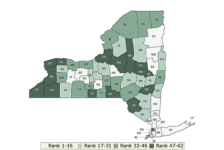In a groundbreaking move three years ago, New York introduced the first-in-the-nation “recovery-friendly workplace tax credit” to encourage employers to support individuals in recovery from substance use disorders. However, recent data reveals a stark reality: out of the $6 million allocated for this initiative, only $6,000 has been utilized by qualified for-profit employers since its inception in 2019.
The tax credit, offering up to $2,000 per year for each qualified new hire in recovery, aims to combat the stigma surrounding addiction and foster a culture where employers actively hire and support individuals overcoming substance use disorders. Despite its potential to make “recovery-ready” or “recovery-friendly” workplaces more prevalent, the initiative has not gained the traction it deserves.
Between 2009 and 2015, opioids rendered nearly 226,000 New Yorkers unable to work, resulting in a staggering $179.4 billion in lost economic output. Recognizing the economic impact, the American Action Forum underscores the need for recovery-friendly workplaces to retain workers and counterbalance the substantial economic losses.
The inaugural Recovery Ready Workplace New York Symposium, organized by the New York State Coalition to Prevent Addiction and Support Recovery in Employment, addressed this issue earlier this month in Albany. Dean Hale, a training specialist with the New York State Office of Addiction Services and Supports, emphasized the underutilization of the tax credit, highlighting the urgent need for more advocacy and awareness.
The coalition, formed in February 2022, seeks to shift workplace culture to support individuals in recovery. The mission is clear: create an environment that embraces, rather than shuns, those overcoming substance use disorders.
The reluctance of employers to adopt recovery-friendly practices poses a significant hurdle. The opioid epidemic continues to escalate, with nearly 645,000 deaths reported between 1999 and 2021. New York alone recorded 4,233 overdose deaths in 2020, underscoring the urgency of addressing addiction as a public health crisis.
Recovery-friendly workplaces not only benefit individuals in recovery but also prove advantageous for employers. The Northeast Group, led by President Mike Carpenter, stands as a model for recovery-ready workplaces, emphasizing the importance of creating an open and supportive environment. Carpenter, who has been running a recovery-ready workplace since the mid-1990s, recognizes the value of hiring individuals in recovery. His company’s philosophy revolves around embracing recovery, providing support, and accommodating the unique needs of employees in recovery.
Workplaces like The Northeast Group challenge the prevailing notion that addiction should be swept under the company rug. Instead of stigmatizing those in recovery, recovery-friendly workplaces actively seek to hire individuals overcoming substance use disorders and commit to supporting their recovery journey.
The benefits extend beyond altruism; recovery-friendly practices lead to higher employee retention rates and increased productivity. According to the U.S. Department of Labor, workers in recovery take nearly 10% fewer unscheduled leave days per year than the average worker, resulting in a 12% lower turnover rate.
Recognizing the need for standardized guidelines for recovery-friendly workplaces, the New York Prevent Addiction and Support Recovery in Employment coalition is drafting legislation expected to be introduced next year. The aim is to garner support from both labor groups and private employers, ensuring a comprehensive and inclusive approach to fostering recovery-ready workplaces.
Despite the compelling case for embracing recovery-friendly practices, the reluctance to utilize available tax credits remains a critical challenge. Increased advocacy, awareness, and education are essential to shift the narrative around addiction in the workplace and promote a more compassionate and supportive environment for those in recovery.
Read More Here



